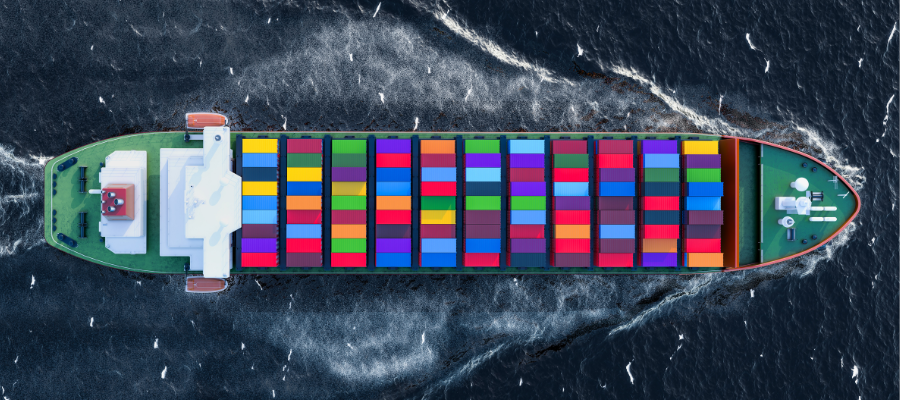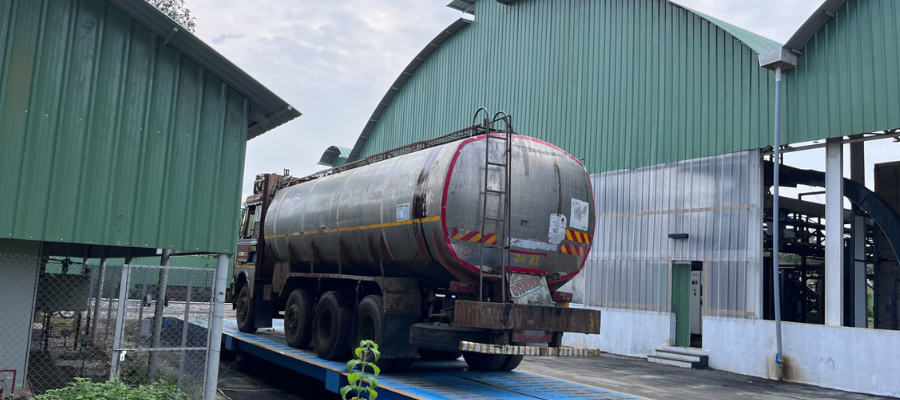🕒 Article read time: 2 minutes
The Danish company aiming to remove at least one gigaton of carbon from the atmosphere by 2040

Interview with CEO of MASH Makes, Jakob Bejbro Andersen, PHD
MASH Makes aims to remove at least one gigaton of carbon from the atmosphere by 2040.
Its mission is to produce bio-oil, hydrogen and electricity out of agricultural waste using automated machines. The main byproduct of this process is biochar – a soil amendment that actively absorbs CO2 from the atmosphere. Biochar can then be used to enrich the soil and support the growth of plants.
The first operational MASH thermochemical plant is located in Karnataka, India, with multiple others planned to significantly expand carbon removal efforts globally.
Thanks for meeting with us, Jakob. So, what is MashMakes' mission?
In many ways it’s quite straightforward really. It’s called ‘gigaton thinking’. Our ambition is to remove at least one gigaton CO2 equivalent from the atmosphere by 2040.
The more interesting part is how we set out to do that. We do this by applying our own proprietary technology platform that enables us to do a lot of very exciting things.
This technology comes from the Technical University of Denmark. We are essentially standing on the shoulders of these researchers, who have 40 plus years’ experience within this field of research. Fundamentally, we can take different types of biomass residues and process them to create an energy output.
The other part is that we produce this thing called biochar. We always have those two things. The really neat thing about biochar is that we can actually use it to improve the output of, let’s say, arid soils so that they can start producing biomass. This could be a food crop or whatever.
Then there will be a residue there that means more biomass is created and that equates to a scaling of our platform. We want to produce fuel and other energy products in quantities that allow us to make a big dent in the GHG emissions.
How will your project affect and influence the logistics sector exactly?
So right now, we have mostly focused on the shipping sector but what we're starting to do is look at producing something that looks like a heavy fuel and eventually more diesel-like products and - in the not-so-distant future - hydrogen.
Of course, we can also convert all this into electricity if we want to but one of our key tenets is that we want to focus on what we call drop-in solutions that don't require a reshuffle and a reworking of the entire sort of infrastructure that you have in the different sectors.
Our most recent versions of fuel are much closer to diesel than earlier versions. And we are just progressing along that line. We will - very soon – be able to synthesise things like methanol, ethanol and all those fuels that are used in the logistics sector.
That's really the pathway we're starting with – going for the lower hanging or lower grade products and then moving into ever more ambitious commodity targets.
And how has this been received so far amongst the logistics sector?
Well, we have mostly worked with shipping so far, but we are looking further afield. We have approached terminals for example, but bandwidth has meant that shipping is the first sector we have been working with.

And do these fuels require a big reengineering of the current machinery?
The great thing is it works in existing infrastructure. You don't have to have all the kinds of safeguards which you have for gaseous fuels or for methanol and all these types of things.
So, it is a ‘drop in’ system and, you know this is something that these guys have been pining for, for ages.
This is crucial, as reengineering current machinery and retrofitting ships is a nightmare for the shipping industry – it requires ship owners to take vessels out of service and then spend a heck of a lot of money on these alterations.
In addition, even if today the whole shipping sector decided that it was going to commit to retrofitting ships, it wouldn't be able to do this quickly because there's simply not enough shipyards on the globe to achieve that. Having these drop in fuels is key to transitioning to net zero shipping.
In fact, these fuels are far more scalable than many people would currently believe.
How well known in the shipping industry has MASH Makes become?
We are talking to a lot of the world's biggest ship owners, and they are following this very, very closely and with a great deal of interest. We've not been that deliberate in publishing anything because we already had so much interest from these parties.
I think there's been a big, positive shift towards alternative fuel solutions like our bio-oil. It is very clear from recent developments that they are really eyeing this space, the biofuel space, the pyrolytic, or the thermochemical biofuel space as something that will have a much bigger role.
Do you see a time when you would be able to supply en masse, other modes of transport?
Absolutely. Ours is a gigaton ambition, right? There's a finite amount of stuff like uranium and gold on the earth. The thing we have in our own production is an output which is literally able to turn deserts into productive biomass systems.
We are going to do this in India in the near future - find arid areas that are today unproductive and treat them with our biochar channel.
We will make sure that there are meaningful allocations to local farming communities so they can gain from these areas being developed. And then we ask, ever so kindly at the end of the day, could we take your residues, right?
You don't care if they're going to produce food for local systems or wood for materials, we just want to take the residues that would come from whatever they're doing.
That is a key component to our scaling strategy. These are like two dots that have just been sitting there and for some reason, no one's ever drawn a line between them. It's so obvious and this is something we are trying right now in India.
It sounds like the kind of thing that should be on government radars as well as businesses.
There is a sort of humanitarian tint to it, that is, as you say, absolutely something where we're seeing a lot of interest from what you call development, finance institutions, who are typically government bodies or semi government bodies.
Even NGO funds - these big development funds have heard of it - like the Bill and Melinda Gates foundations of the world. So yeah, absolutely. In our work, there's a synergy between creating better lives for impoverished populations and at the same time strengthening sustainable energy systems. That's a win.
Can you give me an idea as to how big the company is?
MASH Makes is comprised of a team of 65 people across Denmark and India. Our existing site in India is reaching optimum productivity later this year and we have already funded the next one. Our existing plant is producing biochar as we speak and we're very close to closing on the third and fourth sites.
We can maybe build 50 to 100 more factories of this particular type. But if we are to have the necessary impact, we will need literally tens of thousands of them.
If something goes wrong, if there's a problem, like a drought, bureaucracy or corruption, whatever, you can literally pick the stuff up and redeploy it elsewhere. Everything comes off an assembly line and that means that this ambition of scaling to tens of thousands of sites is really inherent in how we design these sites.
And so why India? Is that because it's very rich in the resources you need?
 The first MASH thermochemical plant, Karnataka, India
The first MASH thermochemical plant, Karnataka, India
Exactly. This isn’t the classic Danish commercial rollout fantasy, which is ‘let's make it work in Denmark and then we go to the rest of the world’. Denmark doesn't look anywhere like the rest of the world. India is of a lot more like the rest of the world than Denmark.
By this I mean, for example, the cost of labour. If I was to do something like this in Denmark, I would have a very high degree of automation in place compared to the likes of India or Kenya. That simply means that I'm missing out on the opportunity for local job creation, the chance to create a decent job for someone.
But the main reason from a strategic perspective is that there are just far greater biomass residue resources in India, in sub-Saharan Africa, and in South America. Europe really isn't the panacea for bioenergy that many would have us think. The big resources are elsewhere on the globe, and we want to develop a solution that works on a global scale.
Maybe the future for British logistics could be to actually source fuels that are produced sustainably and responsibly with great positive social and environmental impact in a place like India.
Published On: 01/08/2024 13:59:19

Comments Section
If you are a Logistics UK member login to add comments.